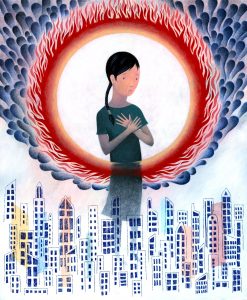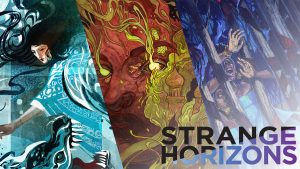Editor’s note: We haven’t officially discussed many of the Hugo nominations this year, but our fabulous Merrin wanted to tackle the short stories. Who were we to say no! Merrin has covered this particular category of the Hugos twice before, so she knows her stuff. Handy links have been provided for your own reading enjoyment, and you should definitely check out this year’s nominees. If you want to take a trip down memory lane, check out Merrin’s past commentary here and here! Wanna vote for the Hugo awards this year? Find out all that you need to know right here.
It’s Hugo Season! Voting commenced on July 8 and this year’s selection of short stories may be the strongest I’ve read in a long time. So let’s jump right in, shall we?
 “Do Not Look Back, My Lion” by Alix E. Harrow
“Do Not Look Back, My Lion” by Alix E. Harrow
“Small people do not kill kings; they do not alter anyone’s destiny but their own.”
In a matriarchal, warlike society, a woman who has lost much defies her emperor and her own family to save her child.
I generally enjoy being thrust straight into the middle of the action without a lot of explanation, and that definitely happened here. But it was a little too confusing at first. Eafa, a woman, is referred to as a husband, and I read the first paragraph about five times trying to discern if that was a typo or not. By the end, I really liked what they’d done with the gendered terminology, it just took a while to get used to.
While the framework is new, the story isn’t. It also had the unfinished feeling of something that could have been much larger, instead of feeling self-contained. And while I liked this a lot and sobbed buckets at the end, compared to the absolute brilliance of some of the other entries, this one misses for me.
 “A Catalog of Storms” by Fran Wilde
“A Catalog of Storms” by Fran Wilde
“A Loss That’s Probably Your Fault: a really quiet storm. Mean too. It gets smaller and smaller until it tears right through you.”
A global warming story with a bit of fantasy thrown in. As the seas rose and the weather grew more violent, humans turned into “weathermen” who could name and fight the storms that hit this small coastal town.
On another ballot, this might rank higher for me. It’s a kind of quiet little tale about a small family, a mother and three daughters. One a person is chosen by . . . fate, I suppose, to be a weatherman, they turn into elements of the storm that they then fight to help protect the humans left. It’s an honor and a curse all at once. So the story is big, in that it’s thematically interesting and important, but also small, in that it’s about this family and their sorrow in losing one of their daughters.
It’s beautifully written, and I love the idea of the transformation into the weathermen. There’s not a bad story on this ballot, but there are definitely some that pull apart from the rest.
 “Ten Excerpts from an Annotated Bibliography on the Cannibal Women of Ratnabar Island” by Nibedita Sen
“Ten Excerpts from an Annotated Bibliography on the Cannibal Women of Ratnabar Island” by Nibedita Sen
“How shall we live, with Ratnabar in our blood but English on our tongues?”
Exactly what it says on the tin, and the tin is weird.
This may be one that I need to sit with to fully appreciate and understand. The framework is incredibly interesting. It really is just ten excerpts from an annotated bibliography, telling the story of these cannibals and their descendants. The tonal shift from entry to entry is masterful, they truly do feel like ten distinct pieces of writing.
Did I love it? I can’t say that I did. But I found it fascinating in ways I can’t really articulate here now. It’s gonna stick with me, but I wouldn’t pick it first.
 “Blood is Another Word for Hunger” by Rivers Solomon
“Blood is Another Word for Hunger” by Rivers Solomon
“They were a family, as exuberant in their togetherness as they were in their resurrections.”
While the Civil War rages in the US, Sully, a young slave woman, kills the family that owns her. The imbalance in the universe causes her to give birth to their replacements, so she builds them a safe place to live.
This story begins with the longest sentence I believe I have ever read, and it packs a wallop, as that is where the revenge happens. Sully gives birth to revenants to replace the white folks she has killed and with these souls helps create a kind of paradise for all of them. There’s a powerful element of taking charge of her own destiny, of rebirth and reclamation, that I don’t truly feel was fully realized. By the end of the short story, Sully was still deferring decisions to others instead of taking charge herself.
It’s a timely story for right now, but could also be a divisive one. Still, it’s high up on my ballot.
 “As the Last I May Know” by SL Huang
“As the Last I May Know” by SL Huang
“Without such a burden, how would any president fully understand what he did when he asked to use such weapons?”
“It’s not about right and wrong, it’s about making it hard.”
Two hundred years after bombs decimated their land, a country hides the codes to their nuclear weapons in the heart of a little girl.
I absolutely sobbed at the conclusion of this story. Nyma is raised to be this vessel, she goes to live with the president of their country so he gets to know her, so using the missiles is a difficult decision. It’s a fascinating idea: nuclear codes with a conscience. Nuclear codes you have to kill to use. Also a timely idea, would we be so eager to bomb each other if that were the sacrifice?
I can’t decide between this story and the next for my winner, but honestly either of them are incredibly deserving.

“And Now His Lordship Is Laughing” by Shiv Ramdas
“Once again, the white-hot rage surges through her, going from kernel to spreading flame so quickly that she scarcely remembers how it began.”
In India during the 1940s, a woman skilled at making living dolls out of jute is forced to make one for the British governor’s wife.
Like “Blood Is Another Word For Hunger,” this story is set in historical times, but has a broader scope, and I learned pretty atrocious things the British government did to the Indian people in the name of the war effort, including enacting a policy that caused 3 million people to die of starvation. With this as a backdrop, a British officer visits a starving old woman to force her to make a doll.
The rage in this story is visceral. It bleeds off the page, off every word. It’s uncomfortable to read in exactly the way it should be.
My final ranking:
- “And Now His Lordship Is Laughing”
- “As the Last I May Know”
- “Blood Is Another Word For Hunger”
- “Ten Excerpts from an Annotated Bibliography on the Cannibal Women of Ratnabar Island”
- “A Catalog of Storms”
- “Do Not Look Back, My Lion”

I’ve heard of the premise of “As the Last I May Know” by SL Huang before, the idea of putting the nuclear codes inside a human body so that the president/leader has to take a human life with their own hands before using nuclear weapons, It sounds like an interesting story.
It really was! I’ve heard of the idea but haven’t actually read any other stories or books with that as its premise.